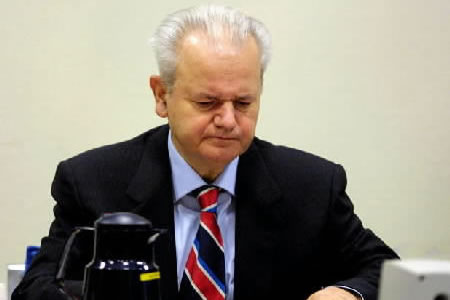Home
MILOSEVIC THE DEFENSE COUNSEL GIVES RISE TO THE RISK OF UNFAIRNESS IN THE TRIAL OF MILOSEVIC THE ACCUSED
Trial Chamber makes public in writing its reasons for deciding to assign counsel to Milosevic. New details about his misuse of medication unveiled. The trial is to continue before the Appeals Chamber renders its decision.
 Slobodan Milosevic in the courtroom
Slobodan Milosevic in the courtroom Three weeks after the Trial Chamber’s oral decision assigning counsel to Slobodan Milosevic, the detailed reasons that prompted it to issue the decision were made public yesterday in writing.
Its 30-odd pages contain a detailed procedural background of the Milosevic case and analysis and interpretation of articles 20 and 21 of the Tribunal Statute, which define the duties of the Trial Chamber and the rights of the accused.
As indicated in the Reasons, the primary duty of the Chamber is to ensure a fair and expeditious trial. In situations where the continued self-representation of the accused risks a trial that is not conducted fairly or expeditiously, the Trial Chamber is obliged to take measures to eliminate the risks. The Chamber is not obliged to indulge the wish of an accused to defend himself if his capacity to do so is limited or impaired to such an extent that there is a material risk that the trial will not be fair.
The Reasons state further that the jurisprudence of the Tribunal in The Hague, as well as the Rwanda and Sierra Leone tribunals, accepts that the right of an accused to defend himself is not absolute, and that there are circumstances in which an accused may be assigned counsel contrary to his wishes. Judges quote in their favor a judgment rendered by the European Court for Human Rights; it states explicitly "it is for the courts to decide whether the interests of justice require the accused be defended by counsel appointed by them.” According to the ECHR, "avoiding interruptions or adjournments corresponds to an interest of justice which […] may well justify an appointment against the accused's wishes."
Noting that in most European countries people charged with serious offences must be represented by professional legal counsel, the Chamber quotes Article 71 of the FRY Code on Criminal Procedure, still in force in Serbia. It says an accused charged with offences that carry in excess of ten years imprisonment must be represented by professional defense counsel in court.
The Reasons also unveil new details about Milosevic's misuse of medication. Blood tests run by a leading Dutch toxicologist reveal significantly lower levels of the drug Metoprolol; the accused should be taking this drug as part of the therapy prescribed by his Dutch cardiologist. Blood samples also contained traces of unidentified tranquilizers that are not on the list of drugs prescribed to the accused. Furthermore, the Dutch cardiologist stated in his last report that he was "very surprised by the recent discovery of an unknown medication in the accused's possession, which was not supplied by the personnel of the UN Detention Unit."
After the Reasons were made public, Milosevic's defense counsel was given seven days to file an appeal against the decision to assign counsel; the prosecution will then have two more weeks to respond to the appeal. This means the Appeals Chamber will be unable to render its decision before 12 October, the date when the trial of Slobodan Milosevic continues.
Linked Reports
- Case : Milosevic Slobodan - "Kosovo, Croatia and Bosnia"
- 2004-09-15 MILOSEVIC TRIAL ADJOURNED UNTIL 12 OCTOBER
- 2004-09-14 VERIFIER VS. VERIFIER
- 2004-09-14 HEARING ON THE MOTION TO SUSPEND MILOSEVIC TRIAL TO BE HELD TOMORROW
- 2004-09-30 KAY DEMANDS HEARING ON THE APPEAL CHALLENGING DECISION TO ASSIGN COUNSEL
- 2004-10-12 TESTIMONY ABOUT THE WAR THAT WAS "STAGED" IN KOSOVO
- 2004-10-13 APPEALS CHAMBER TO HEAR ARGUMENTS ON THE ASSIGNMENT OF COUNSEL TO MILOSEVIC ON 21 OCTOBER
